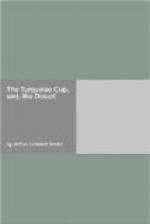The priest hesitated, crossed himself, and answered: “They were the words of Jesus.”
“To whom were they spoken?” asked Abdullah.
The answer lagged. Finally, the priest said, “To His mother.”
“Master,” said Abdullah, “the more I learn of my new religion, the more I am enamoured of it;” and he went to the chamber-door and knocked.
“Beloved,” he said, and waited.
He knocked again, and again he said, “Beloved.”
“Who art thou?” came a voice.
“’Tis I, Abdullah,” he said.
“Enter,” said the voice.
“Not so,” said Abdullah; “but come you out.”
“Art thou alone?” asked the voice.
“No,” replied Abdullah, “the man who keeps goats is here.”
“I have no light,” said the voice.
Abdullah took the taper from the table, opened the door six inches, felt a warm soft hand meet his own, pressed it, left the taper in it, closed the door, and groped in darkness to his seat.
“Father,” he said, after some moments of silence, “have women souls?”
“Doubtless,” answered the priest.
“God help them,” said Abdullah; “have they not trouble enough, without souls to save?”
The two men sat silent in the darkness.
The door creaked, a line of light appeared; the door swung wide out, and on the threshold stood Nicha, the taper in her hand.
The two men sat silent, gazing.
She had put off her outer costume of white linen and stood dressed for the house, the seraglio. Upon her head was a chachia, a little velvet cap, embroidered with seed-pearls. Her bust was clothed with a rlila, or bolero of brocaded silk, beneath which was a vest of muslin, heavy with gold buttons. About her slim waist was a fouta, or scarf of striped silk. Below came the serroual, wide trousers of white silk that ended mid-leg. Upon her feet were blue velvet slippers, pointed, turned up at the toes and embroidered with gold. About her ankles were redeefs, or bangles of emeralds, pierced, and strung on common string. At her wrists hung a multitude of bangles, and on her bare left arm, near the shoulder, was a gold wire that pinched the flesh, and from it hung a filigree medallion that covered her crest, tattooed beneath the skin. It is always so with the tribe of Ouled Nail.
This was the costume of the woman, but the woman herself, as she stood in the doorway, the taper in her hand, who may describe her? Tall, lithe, laughing—her black hair, braided, tied behind her neck, and still reaching the ground; her eyebrows straight as though pencilled; her ears small and closely set; her nose straight and thin, with fluttering nostrils; her shoulders sloping; her bust firm and pulsating beneath her linen vest; her slender waist; her little feet, in the blue velvet slippers; the charm of breeding and of youth; the added charm of jewels and of soft textures; what wonder that the two men sat silent and gazing?




